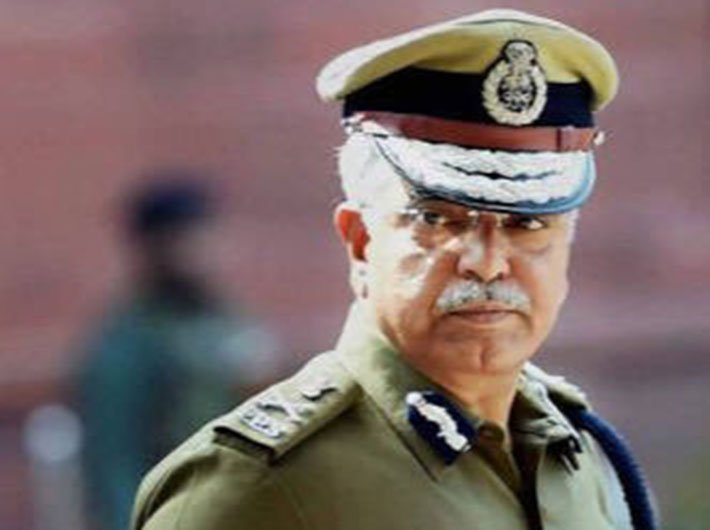Thank You, Mr Bhim Sain Bassi, commissioner of Delhi police, for turning JNUSU president Kanhaiya Kumar into a nationally acclaimed figure overnight, after charging him with sedition. Delhi police, with its motto – “Shanti-Seva-Nyaya”, seems to have lost it completely this time around.
Bassi, a 1977 batch IPS officer who retires on February 29, has been loyal to his masters. His frequent spats with AAP leaders have been ample demonstration of his devotion towards the BJP government at the centre. In return, he was to become an information commissioner in the central information commission (CIC) after retirement. But after overenthusiasm in the JNU case his name was dropped from the list of candidates. It seems that Bassi has become more of a liability and embarrassment for the centre.
Returning to the sedition charge, Kanhaiya’s speech – at an event in the JNU campus on February 9 – did not have a word which could be termed anti-national, though he was critical of the BJP and the Sangh Parivar. It was a TV news channel’s report that prompted the police to take notice. In this channel’s video coverage, anti-India and pro-Pakistan slogans could be heard, and the faces of Kanhaiya and others could be seen, but whether the voices and faces matched was an open question. Can police act on a video clip aired by a news channel? Is it not the duty of police to check if the footage is genuine or doctored? How could the police jump the gun and conclude that anti-India slogans were raised and were raised by Kanhaiya and his associates?
Instead, police swooped down on the JNU campus and arrested Kanhaiya. If anti-India slogans were indeed raised in the campus, it remains to be established who did so, though Kanhaiya certainly did not convene the meeting in memory of parliament terror attack convict Afzal Guru.
Now, to prove how unprofessional the Delhi police was, the producer of that news channel has resigned, saying “The video didn’t have any ‘Pakistan Zindabad’ slogans at all – yet we played it repeatedly to spread madness and mayhem.”
If you think that Delhi police is pro-active, and erred only because of overenthusiasm, what about Delhi BJP MLA OP Sharma’s actions? Sharma and his supporters assaulted CPI leader Ameeque Jamei, as well as some media persons and JNU faculty and students, in the Patiala House court premises, on February 16, when Kanhaiya was to be produced there. Violence went on even as policemen looked away. Bassi termed it as a minor scuffle though Sharma went on record owning up his action and making more sinister threats. That failed to move Bassi.
After much criticism, police registered two FIRs against unknown persons even though cameras clearly showed Sharma and his supporters as attackers. Sharma was arrested – only to be bailed out straight from the police station itself. Some lawyers who participated in violence were merely summoned but they did not even bother to respond to the summons.
During his next court appearance, police could not provide security or a safe passage to Kanhaiya and he was assaulted by some lawyers, forcing the supreme court to intervene.
Former top cops are not amused
Many veteran police officers are highly critical of the conduct of Bassi and his men. Former director general of police of Uttar Pradesh Shri Ram Arun says anybody holding a high post in police should follow the rule of law in terms of what has been written in the IPC, the CrPC and the Police Act only. He says that only after an officer has hung his boots and uniform is he free to join any political outfit.
Former UP inspector general of police SR Darapuri also says Bassi danced to the tune of his political masters in this case, and that is highly unbecoming and unethical for a police officer. He says that Bassi has failed on not one but several accounts. He questions the haste of police to arrest Kanhaiya without intensive investigation. Referring to Bassi’s statement later that police won’t oppose bail for Kanhaiya, Darapuri says it was as a sheer face-saving exercise as police did not have any proof.
Darapuri is also highly critical of the security failure in the Patiala House court premises and terms it as willful negligence as part of acts of both commission and omission. He adds that the supreme court should haul up Bassi for his shoddy work in this episode. “If the Delhi police fails to secure a small area of a court in Delhi, how will this force provide security to the entire city!”
View of Legal Eagles in the Sedition Charge
Legal luminaries too have termed the Delhi police’s actions as premature and politically motivated. As for Bassi’s statement on February 22 that the other accused students will have to prove their innocence, noted lawyer KTS Tulsi says that there is no question for a citizen to prove his innocence; rather it is for the police to prove the guilt. Police cannot ignore factors in favour of the accused and get doctored evidence, he adds. Instead of serving their political masters, he adds, police must realise that they are servants of law. He says that this also explains the collaboration between the lawyers and the police in Patiala House courts which was an open defiance of the orders of the supreme court.
Pradeep Rai, a senior advocate of the supreme court, says that it is indeed amusing when the Delhi police commissioner says that they won’t oppose Kanhaiya’s bail in court. He says that is seems Bassi is not sure whether charges of sedition will stand in court and the arrest was made in undue haste without investigating the matter. Rai adds that it is heard that some other people, who are still evading the law, were perhaps involved in chanting anti-India slogans.
Another supreme court advocate, Gaurav Bansal says that Bassi no doubt knew well that this case would turn into a political potboiler. Hurriedly arresting Kanhaiya without proper investigation clearly shows that at the end of his career, Bassi wanted to be in the good books of the ruling party, he adds.
Challenge before Bassi’s successor
The Delhi police is regarded as one of the most prestigious forces of the country. It reports to no less than the home minister of the country. It has been headed by many great officers. Never before has Delhi Police seen a commissioner who has been so politically aligned to the ruling party.
Delhi police gets its new commissioner, Alok Kumar, an IPS officer of the 1979 batch AGMUT cadre, on March 1. Kumar has his task cut out. He has a stint of about 17 months to make the force impartial and professional.
feedback@governancenow.com
(The article appears in the March 1-15, 2016 issue)

